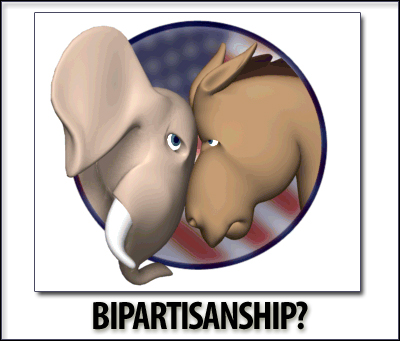
By Tracie Powell
Republican Senator Judd Gregg’s dismissal of President Obama’s offer to serve as Commerce secretary - on the heels of a stimulus bill passed almost entirely along partisan lines - shows that bipartisanship in this town is just a word that doesn’t carry much weight.
Obama should have known better. After all, it was the new RNC Chairman Michael Steele who first put him on notice when he said last month that “bipartisanship is overrated.” Funny, Steele (like Obama) talked a lot about change when he campaigned, but that was before he won the chairmanship.
And say what you want about Rush Limbaugh, but the man was just being honest when he said that he hopes Obama fails.
Quiet as it’s kept, more than a few Republicans probably share Limbaugh’s wishes, says Allan Lichtman, a presidential historian at American University. “I think Republicans believe that their only chance to win is by being in staunch opposition, and if (Obama’s) policies fail, to be in a position to then make major gains in the midterm elections of 2010.”
In terms of appearances, Obama has gone above and beyond to reach out to members of the Republican Party. Problem is, nobody’s reaching back.
There was a time when presidents were more interested in policy than politics, said Richard Skinner, a government and legal studies professor at Bowdoin College in Maine.
Starting with Ronald Reagan there has been a rise in partisan presidencies; George W. Bush, however, brought partisanship to a new extreme “perhaps to the point when practice becomes pathology,” said Skinner, who wrote an article about the topic in a recent issue of Political Science Quarterly.
Dwight Eisenhower, Lyndon B. Johnson and Jimmy Carter all sought a nonpartisan image, reaching out to voters instead of party leaders. And, according to Skinner, Eisenhower openly displayed apathy toward the GOP while Richard Nixon and Johnson actually distrusted their respective national party committees.
“The past quarter century has seen a reversal of the trend toward weaker relationships between presidents and their parties,” Skinner writes. “Beginning with Ronald Reagan, recent presidents have increasingly relied upon their parties for support both in the electorate and in the Congress. They have presented a more distinctively partisan image to voters and have found it difficult to cultivate support from the opposition.”
To his credit Obama seems to be seeking a return to a more conciliatory time in which presidents relied less on vociferous extreme party wings and more on competent professionals.
In addition to the Gregg nomination, Obama added Texas Republican Ray LaHood to his cabinet and is keeping Bush appointee Robert Gates as Defense secretary. Before that, he placed prominent Republicans in high profile positions in events leading up to his inauguration and invited Republicans into his inner sanctum to discuss the stimulus bill before it even went up for a vote. When it came time to vote, not a single Republican in the House voted for the bill, and all but three shunned it in the Senate.
This week the GOP tried to say it was Democrats like Speaker Nancy Pelosi who they have problems with, not Obama. But that too is circumspect upon closer examination.
Click here to read the rest...
No comments:
Post a Comment